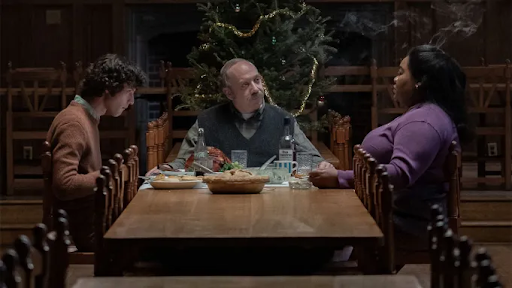Source: The Hollywood Reporter
When the 96th Academy Awards concluded during the evening of March 10th, many believed that the long and laborious award season had finally reached its end. After all, many consider the Oscars to be the most highly anticipated award show of the season, so once it’s over, so is the yearly film awards circuit. As it turns out however, the end of award season had not fully been reached; in fact, even after over a month since the Academy Awards’ announcement of Christopher Nolan’s “Oppenheimer” as the Best Picture of the year 2023, there are still a small handful of smaller organizations and ceremonies still in need of handing out their own respective awards. One of these organizations was the Writers Guild of America (WGA), a labor union consisting of hundreds of film and television writers currently working throughout the American entertainment industry. Although the exact reasons for the WGA choosing to hold its award ceremony after the Academy Awards instead of before it like in previous years (and like how nearly every other major Hollywood guild, including the Directors Guild of America and the Screen Actors Guild – American Federation of Television and Radio Artists), many suggest that the months-long strike the WGA participated in last year may be a significant factor, as its placing of normal operations on hold likely forced the WGA to postpone its yearly event rather than haphazardly try to plan it before the Oscars. Whatever the case may be, the Writers Guild Awards nonetheless took place on Sunday, April 14th, and even if the outcomes of certain categories weren’t too difficult to predict, there was still plenty to celebrate for those honored.
Of the various awards handed out by the WGA, only three relate specifically to materials written for the cinematic medium: Best Original Screenplay, Best Adapted Screenplay, and Best Documentary Screenplay. The latter may sound rather unusual in theory given that the purpose of a documentary is to showcase real-live people and events instead of completely make them up, but in many cases, a proper screenplay can allow a documentary filmmaker to get their intentions across in an effective manner. This year (as is normally the case), the WGA chose to nominate five documentary features in this category: “Bella!”, written by Jeff L. Lieberman; “It Ain’t Over”, written by Sean Mullin; “Stamped from the Beginning”, written by David Teague and adapted from Dr. Ibram X. Kendi’s book of the same name; “What the Hell Happned to Sweat, Blood, and Tears?”, written by John Scheinfeld; and the ultimate winner, “The Pigeon Tunnel”, written by Errol Morris.
Over in the category for Best Adapted Screenplay, Cord Jefferson’s Academy Award winning screenplay for “American Fiction”, which he based on the Percival Everett novel “Erasure”, added further to its success streak with yet another major award win. In earning the WGA prize, “American Fiction” overcame the competition of four other nominees, some of which it also competed with at the Oscars: “Are You There God? It’s Me, Margaret”, written Kelly Fremon Craig and based on the book by Judy Blume; “Killers of the Flower Moon”, written by Martin Scorsese & Eric Roth and based on the book by David Grann; “Nyad”, written by Julie Cox and based on the book “Find a Way” by Diana Nyad; and “Oppenheimer”, written by Christopher Nolan and based on the book “American Prometheus: The Triumph and Tragedy of J. Robert Oppenheimer” by Kai Bird and Martin J. Sherwin.
The outcome of Best Oirignal Screenplay, on the other hand, was a little less predictable due to “Anatomy of a Fall”, which had won the Oscar for this exact same category, was deemed ineligible for a nomination by the WGA. Nonetheless, it wasn’t too difficult to determine which film would win; with its biggest source of competition out of the way, David Hemingson’s screenplay for “The Holdovers” was able to come out on top. In doing so, it overcame the competition of these four additional nominees: “Air”, written by Alex Convery; “Barbie”, written by Greta Gerwig and Noah Baumbach (which ironically was nominated for Best Adapted Screenplay at the Academy Awards due to it being based on the doll character of the same name); “May December”, written by Sammy Burch and Alex Mechanik; and “Past Lives”, written by Celine Song. In his acceptance speech, Hemingson credited “a brilliant cast [including the likes of Paul Giamatti, Da’Vine Joy Randolph, and Dominic Sessa] and a brilliant director [Alexander Payne]” while also paying tribute to his family, specifically (in his own words), “in memory of my mother who raised me, my uncle who saved me, and my father, who gave me my love of the written word and taught me the value of integrity.”
There were many acceptance speeches like the one Hemingson gave that came across as rather heartfelt and endearing, but there were also quite a few speeches that maintained a sarcastic and critical tone as well, many of them addressing the very reasons why the WGA went on strike several months ago. At the ceremony’s New York location (the event was held simultaneously in both New York City, and Los Angeles, California), host Josh Gondelman joked about his own difficulty working as a writer in the aftermath of the strike, claiming that he remains unemployed as a way to show solidarity with his fellow writer while nothing that some people are still getting back on their feet… just to make ends meet, Jon Stewart was forced to take a part-time job working Monday nights”. However, the strongest speech that directly referenced the strike came from the WGA’s Eastern Division president Lisa Takeuchi Cullen, who thanked all the other guilds that striked with or showed their support for the WGA during the time when they most needed it. “To me, the most pivotal moments of the WGA strike of 2023 were each and every time we were joined by our sister unions,” Cullen stated. “Each and every time Local 802 of the American Federation of Musicians showed up to play honky tonk on the sidewalks of New York City. Each and every time a Teamster truck driver refused to cross our line. Each and every time an IATSE crew member sacrificed their day’s pay for our cause. Each and every time a SAG-AFTRA actor grabbed a megaphone out of our hands and chanted chants that did not rhyme. Thank you for your solidarity. We are one union, and we stand by your side, forever.”




